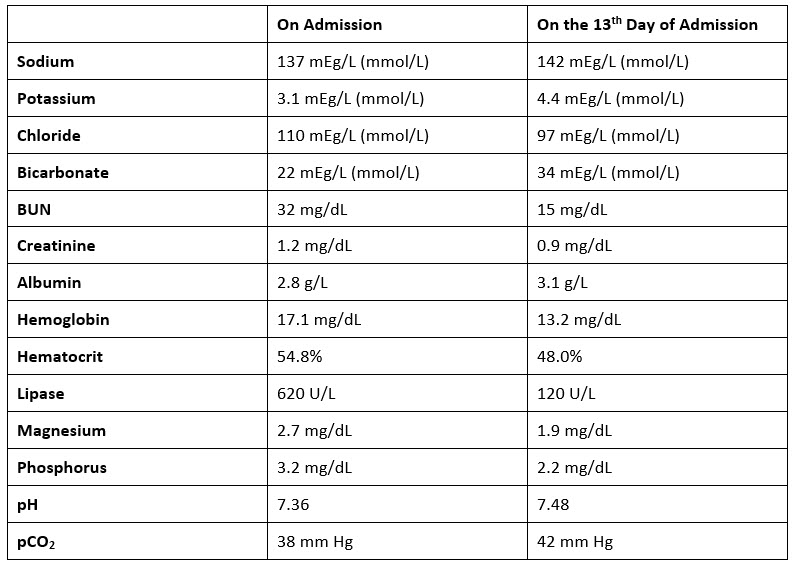Question 7#
A 54-year-old male was brought to the emergency department with nausea and vomiting. He has a long-standing history of alcohol abuse and cardiomyopathy. He complains of severe abdominal pain. On physical examination:
- his temperature is 37.6°C
- blood pressure is 94/67 mm Hg
- pulse rate is 122 beats/min
- respiratory rate is 20 breaths/min.
- His BMI is 17
He is tender to palpation over the epigastrium, and guarding is noted. He is kept NPO and treated with aggressive fluid resuscitation. Given his poor respiratory status, he is intubated and admitted to the ICU. After 8 days, he is clinically improving but remains unable to tolerate enteral feeds for which he is started on total parenteral nutrition (TPN) for 5 days.
Laboratory data obtained:

Based on the information provided, what is the BEST explanation for his acid-base abnormalities?
A. Excessive vomitingB. Administration of normal saline
C. Malnutrition
D. TPN
E. Acute respiratory distress syndrome
Correct Answer is D
Comment:
Correct Answer: D
In patients who receive parental nutrition, close monitoring of electrolytes and acid-base status is required as complications such as refeeding syndrome and other metabolic disturbances can occur. Parenteral nutrition consists of various cations, such as sodium, potassium, and calcium along with other anions such as chloride. However, in lieu of chloride, acetate is a solution commonly used in parenteral nutrition as a substitute for chloride (as a buffer) as it reduces the incidence of metabolic acidosis and hyperchloremia.
In this case, the patient has developed a metabolic alkalosis after TPN was started. In TPN, if the acetate content is too high, this can lead a metabolic alkalosis because acetate is metabolized to bicarbonate. Similarly, low chloride in TPN solutions will also lead to a metabolic alkalosis. Therefore, to correct this, the chloride content should be increased whereas the amino acid levels should be reduced to aid in reducing the acetate concentration in the TPN.
References:
- Peters O, Ryan S, Matthew L, Cheng K, Lunn J. Randomized controlled trial of acetate in preterm neonates receiving parenteral nutrition. Arch Dis Child. 1997;77:12-15.
- Johnson P. Review of micronutrients in parenteral nutrition for the NICU population. Neonatal Netw. 2014;33(3):155-161.